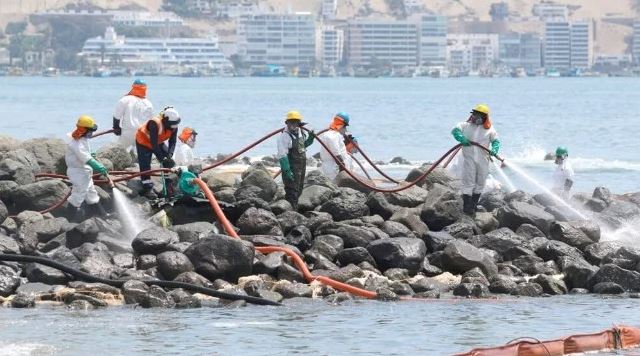Peru filed a civil suit again Repsol and others for liabilities in the January 2022 oil spill off its coast asking the court for a total of $4.5 billion in compensation in what it calls the first civil claim for liabilities in the case. This suit specifically seeks compensation for the affected consumers, users, and third parties and is separate from criminal charges that the authorities were exploring against the managers of Repsol’s La Pampilla refinery complex. Repsol immediately responded calling the liability case baseless citing its ongoing cleanup efforts since a tanker spilled oil at the company’s refinery.
The executive president of Instituto Nacional de Defensa de la Competencia y de la Protección de la Propiedad Intelectual (Indecopi), Julián Fernando Palacín Gutiérrez, announced the filing of the case on May 13 before the 27th Civil Court of the Superior Court of Justice of Lima. He said it was based on the damages suffered by more than 700,000 residents of the region as well as the environmental impact on the coastal areas, beaches, fishing activities, tourism, and commercial activities including more than 20 spas located in the affected areas as well as resorts, restaurants, and other businesses that depend on the tourism in the region.
Indecopi noted that it was presenting an abstract valuation and that the court would set the final amounts based on the evidence. It is asking for $3 billion for the direct damages and an additional $1.5 billion for damages on behalf of the consumers, users, and third parties impacted by the spill. In addition to Repsol, the insurance company Mapfre is named along with the La Pampilla Refinery, shipping agency Transtotal Maritime, and Fratelli d’amico Armatori as operators of the tanker,
The case stems from a January 15, 2022 incident when the oil tanker Mare Doricum released approximately 6,000 barrels of crude oil during an offshore unloaded operation. Respol claims the tanker was struck by unusually high waves that were caused by a volcanic eruption on the island of Tonga and a resulting tsunami. Reports said 28 beaches across 75 nautical miles of coastline were impacted.
Repsol responded in a statement calling the suit “unfounded, inadmissible and incongruous because it does not address the causes of the spill.” They went on to say it also did not address the cleaning and remediation work already completed by Repsol, nor the care channels established by the company for those affected, through collaboration with the Peruvian Government. Commenting on the dollar amount cited by Indecopi, Repsol said “their estimates lack the slightest basis to support the figures indicated.”
Repsol further argues that it has used all the means at its disposal to contain, clean, and remedy the coastline and help the communities in the area. More than 2,900 workers have been assigned to the cleanup, deployed up to 11,000 meters of containment barriers, using 144 units of heavy machinery, nearly 90 boats, and 68 skimmers. In addition, the company cites efforts that have identified over 5,500 individuals impacted by the spill who have received initial compensation of nearly $7.7 million.
Indecopi issued a follow up after Repsol’s response saying that there is no legal basis to debate the role of the Mare Doricum, the cleaning tasks, or the emergency economic aid, as the case is solely about the liability to the impacted residents and businesses that suffered a loss as a result of the oil spill. “This situation hit the economy of people and markets, whose economic lives revolve around beach businesses, fishing, tourism, restaurants, commerce, recreation, among others,” said Julián Palacín Gutiérrez.
In January, less than two weeks after the spill, prosecutors in Lima asked Peruvian courts to prohibit four managers of the La Pampilla refinery complex from leaving the country. They said they were exploring criminal charges while an initial fine of $5 million was levied against the company. The Ministry of the Interior said in addition to fines Repsol could be facing a minimum of $500 million in liabilities for compensation for the effects of the spill.
Source: The Maritime Executive






